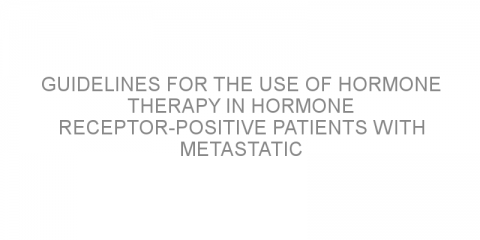In a nutshell This study examined the effect that restarting hormone treatment, as compared to stopping it, had on progression-free survival. It found that restarting treatment led to increased progression-free survival. Some background Breast cancer is classified into different subtypes depending on the prescence or absence of certain...
Read MoreTreatment(s) already received-Hormonal therapy Posts on Medivizor
Guidelines for the use of hormone therapy in hormone receptor-positive patients with metastatic breast cancer.
In a nutshell This report aimed to develop recommendations for endocrine therapy in women with hormone receptor-positive metastatic breast cancer. Some background Endocrine therapy, also known as hormone therapy (HT) is used to treat hormone receptor (HR) positive metastatic breast cancer (MBC). HR positive MBC depends on the hormones estrogen or...
Read MoreA treatment option for advanced breast cancer patients with visceral metastasis
In a nutshell This study aimed to investigate the benefits of fulvestrant (Faslodex) treatment in advanced breast cancer patients. This study concluded that fulvestrant provides a benefit in patients with advanced breast cancer who have visceral metastasis. Some background Advanced breast cancer (ABC) has spread to the lymph nodes and...
Read MoreIs abemaciclib combined with fulvestrant effective in women with HR positive advanced breast cancer?
In a nutshell This study aimed to compare the effectiveness of the combination of fulvestrant (Faslodex) and abemaciclib to fulvestrant alone in patients with advanced breast cancer. This study concluded that the combination of fulvestrant and abemaciclib had improved outcomes for patients when compared to fulvestrant alone. Some background...
Read MoreRadium 223-dichloride as a treatment for castration resistant prostate cancer
In a nutshell This study investigated how effective and safe radium 223 dichloride treatment was in patients with castration resistant prostate cancer (CRPC). It was concluded that radium 223 dichloride increased overall survival, reduced symptomatic skeletal events risk and was safe. Some background Treatment to decrease the male hormones,...
Read MoreCan the neutrophil to lymphocyte ratio predict outcome in enzalutamide-treated prostate cancer patients?
In a nutshell The aim of this study was to determine whether the neutrophil to lymphocyte ratio (NLR) can be used to determine outcome in CRPC patients treated with enzalutamide (Xtandi). It was concluded that NLR could be used to predict the outcome for CRPC patients treated with enzalutamide. Some background Treatment for metastatic...
Read MoreThe use of circulating tumor cells in predicting survival in chemotherapy patients
In a nutshell The aim of this study was to investigate if circulating tumor cells (CTC) levels in the blood could be used to determine the outcome for metastatic castration resistant prostate cancer patients. This study concluded that CTC levels could be used to predict survival in these patients. Some background Treatment for metastatic...
Read MoreHow effective is metronomic chemotherapy with vinorelbine and capecitabine in patients with advanced HER2-negative breast cancer?
In a nutshell This study investigated whether metronomic chemotherapy with oral vinorelbine (Navelbine) and capecitabine (Xeloda) was effective in treating patients with advanced HER2-negative breast cancer (BC). This form of treatment was found to be safe and effective for this patients group. Some background Metronomic chemotherapy is a form of...
Read MoreIncidence of ovarian function recovery in women over 40 with chemotherapy induced amenorrhea
In a nutshell This study investigated ovarian function recovery (OFR) after chemotherapy-induced amenorrhea (absence of menstruation) in women aged 40-49 after 2 years of aromatase inhibitor (AI) therapy. The study concluded that a large number of women with chemotherapy-induced amenorrhea recover ovarian function during AI therapy. Some...
Read MoreTreatments available for advanced, hormone-resistant prostate cancer
In a nutshell The authors aimed to determine guidelines for the treatment of relapsing, metastatic, and hormone-resistant prostate cancer. Some background Metastatic prostate cancer (advanced cancer) is cancer that has spread outside of the prostate to other organs of the body, despite treatment. Hormone therapy is the standard...
Read MoreEnzalutamide or bicalutamide: which treatment provides better quality of life?
In a nutshell The aim of this study was to compare the heath related quality of life (HRQOL) of patients treated with enzalutamide (Xtandi) or bicalutamide (Casodex). It was concluded that enzalutamide led to a better HRQOL in patients with metastatic castration resistant prostate cancer when compared...
Read MoreThe use of MR imaging to predict invasive breast cancer prognosis
In a nutshell This study investigated the use of magnetic resonance (MR) imaging as a prognostic tool in primary breast cancer (BC) patients. The study concluded that MR imaging can identify features which can be used to help predict the risk of distant metastasis (cancer spread to other areas) in patients. Some background Between 20-30%...
Read More













